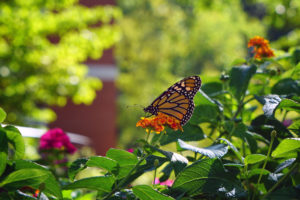The University of Mary Washington has earned a spot on a list of the nation’s most environmentally conscious schools. The ranking appears in the 2021 edition of The Princeton Review’s Guide to Green Colleges, which profiled 416 U.S. schools demonstrating a commitment to sustainability, based on student academic offerings and career preparation, as well as campus policies, initiatives and activities.

“We strongly recommend the University of Mary Washington to students who want to study and live at a green college,” said Rob Franek, The Princeton Review’s editor-in-chief.
In the last decade, the publication has seen a tremendous increase in interest in green practices, programs and offerings from prospective students and their parents, Franek noted. Two-thirds of teens and their families said they’d weigh a college’s commitment to the environment in their decision to apply to or attend a school, according to a survey by The Princeton Review of nearly 13,000 participants.
In 2009, UMW created the President’s Council on Sustainability to inform and advise the University’s leadership on how to manage resources to meet the present needs of the campus community while also reducing its environmental impact for future generations of Eagles.
Mary Washington has since undertaken many green initiatives, including participating in the international RecycleMania competition, hosting an annual Earth Day celebration and holding a “Summer Shred” event to dispose of old documents in a sustainable manner. UMW also works with local non-profit groups like Tree Fredericksburg to help replant trees in the city, and has been recognized by the Arbor Day Foundation as a Tree Campus USA for its commitment to effective urban forest management. And the efforts don’t stop there.
Students can assist UMW’s Office of Sustainability by promoting practices like recycling, gardening and bike-sharing, and participate in green campus organizations like Better Energy Awareness and Mobilization, or BEAM, which advocates for renewable energy sources. There also are opportunities to volunteer or intern with community partners such as Fossil Free Fredericksburg and Friends of the Rappahannock.
For those wishing to take their interest a step further, the Department of Biology recently launched a conservation biology major, and a new partnership gives UMW students the chance to study endangered animals and plants at the Smithsonian Conservation Biology Institute in Front Royal, Virginia. In addition to its environmental and natural science major, the Department of Environmental Science offers a popular environmental sustainability minor that attracts students from other disciplines across the University.
At Mary Washington, eight buildings are LEED-certified, with at least one on each of UMW’s three campuses. Two residence halls, Mason and Randolph, have received LEED gold certification, and UMW has committed to meeting or exceeding LEED silver standards on all new constructions and major renovations.

“The challenge with a historic building is balancing the demands for historic preservation versus the energy efficiency and conservation expected in today’s world,” said Capital Outlay Director Gary Hobson. Renovations to Willard and Virginia halls, two of the oldest buildings on campus, incorporate energy efficient windows, LED lighting, low-flow toilets and sustainable wood furniture, flooring and cabinets, while also respecting the structural integrity of each building.
Two pollinator gardens on the Fredericksburg campus showcase indigenous plants that encourage bees, butterflies, hummingbirds and other pollinators, while a “no-mow” meadow in front of the Jepson Science Center reduces stormwater runoff and protects water quality. Several “bee hotels” on campus provide these insects protection during the winter, and a honey bee hive has been constructed at Brompton and is currently being beta tested.
Moreover, Campus Dining has been recognized as the first university dining program in the state to receive the “Virginia Green” designation for its commitment to conserve resources, reduce food waste and offer more plant-based meals. Nearly half of all menu options are vegan or vegetarian, which also earned UMW the highest rating given by People for the Ethical Treatment of Animals, or PETA. All seafood served is sustainable and one-fifth of produce, milk and eggs comes from local farms. Dining Services has also partnered with the University to distribute reusable cloth shopping bags and is packaging to-go meals in compostable or recyclable containers.
To see the full list of institutions included in the guide, visit https://www.princetonreview.com/college-rankings/green-guide.




Love this! Thank you for all you do to make UMW more sustainable. I hope they move in the direction of solar and other renewable energy.
So proud to see these initiatives get recognition!